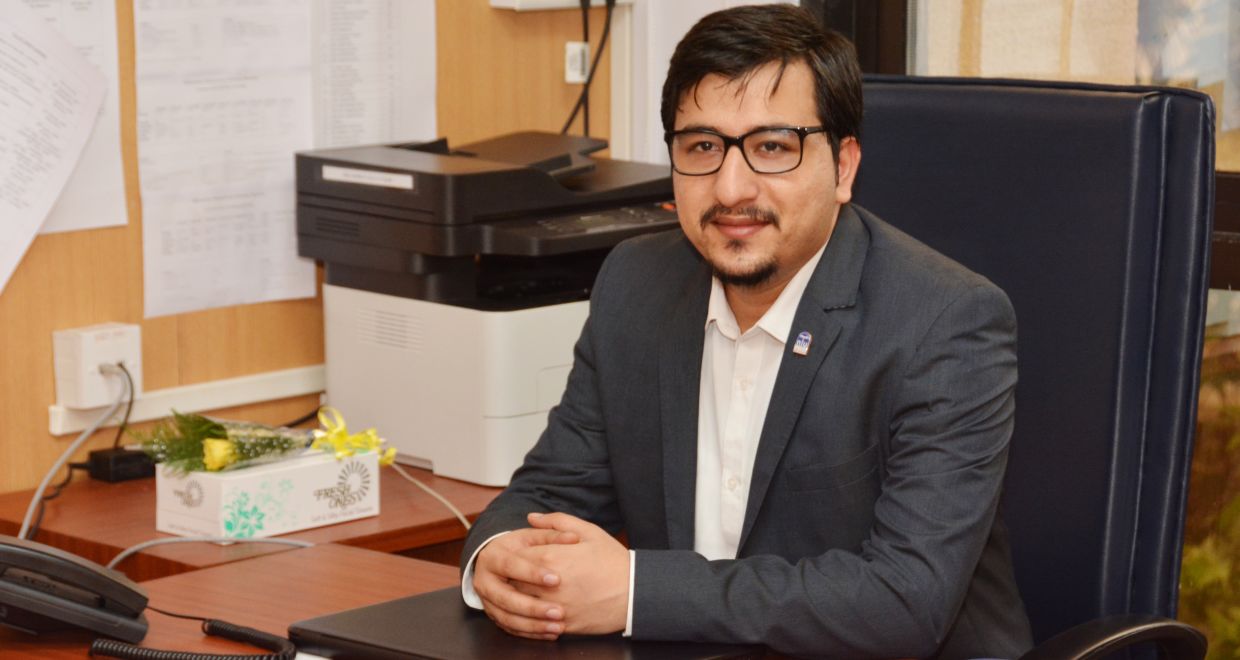Sajid graduated from The Law School, the University of Jammu in 2013. He did his post-graduation from National Law University, Jodhpur and is pursuing his Ph.D. from NALSAR University of Law, Hyderabad. With a passion to help the community, one step at a time, he founded Lawlex organisation in 2013. Presently, he is a faculty at Maharashtra National Law University Mumbai. His research interests are Intellectual Property Law, Law of Torts, Research Methodology and Advocacy Skills.
In this interview he talks about:
- His experience at National Law University, Jodhpur
- His NGO – Lawlex organisation
- Challenges of being a professor
- Tips on writing research papers
TELL US A BIT ABOUT YOUR CHILDHOOD, PRE-COLLEGE LIFE AS WELL AS EDUCATIONAL BACKGROUND.
I have been born and brought up in Jammu (Jammu & Kashmir). I was a shy kid till the seventh standard. From eighth standard onwards, I started developing my interest in literary activities. I wrote two poems that year which I contributed to the school magazine. That was the beginning. Later, I participated in debates, symposium and essay writing competitions and fared well in them. I was much fascinated with science, particularly astronomy which I used to discuss with my friends during breaks.
HOW DID YOUR INTEREST GRAVITATE TOWARDS LAW?
My father is an Advocate. I enjoyed having a look at the files whenever I could get my hand at them. I liked the legal language, the sentence construction and how the arguments were presented. Sometimes, I used to assist my father in his office. Moreover, the fact that this profession could help people get justice inspired me to pursue law.
WHAT DO YOU HAVE TO SAY ABOUT THE SUPPOSED ‘ELITE’ TAG ATTACHED TO CERTAIN LAW SCHOOLS? DO YOU BELIEVE BRANDING OF COLLEGE IS SOMETHING THAT’S VERY RELEVANT/ IMPORTANT AT ANY STAGE IN A LAW STUDENT’S CAREER?
I have a kind of mixed opinion about this, based on what I have observed. Legal luminaries like Ram Jethmalani, Harish Salve, Fali S Nariman studied from traditional universities and are at the top of their profession. They started from the scratch and reached the zenith. But, these days when we rank everything when there are numerous options, ‘elite’ tag can help at entry level. The employer may give you a job based on the glitz of the institution tag, but your retention and growth depend on your knowledge, skill, and perseverance. There is no other route. Tags fail there. I have been told that there is certainly top tier law firms which provide stipends to interns belonging to certain law schools only.
WHAT WERE YOUR AREAS OF INTEREST DURING YOUR GRADUATION? HOW DID YOU GO ABOUT DEVELOPING EXPERTISE AND KNOWLEDGE IN THESE AREAS?
I loved Constitutional Law and Intellectual Property Law. There is no book better to understand law than to read the bare act thoroughly. This is my advice to my students today too. Before exams, I referred to many good books, but during exams, I used to refer to one book only due to time constraints. It’s better to remain focused than to wander.
DID YOU DO ANY INTERNSHIPS OR EXTRA-CURRICULAR ACTIVITIES DURING YOUR LAW SCHOOL DAYS?
The internship is the first step towards learning the etiquette of a profession. I interned under my father mostly. However, I did one internship with Luthra and Luthra Law Firm at Delhi which was phenomenal.
WHEN AND HOW DID YOU DECIDE TO PURSUE MASTERS? WAS IT A PROFESSIONAL REQUIREMENT OR AN ENDEAVOUR OUT OF ACADEMIC INTERESTS?
After my undergrad, I wanted to pursue my post-graduation either from abroad or from an NLU. I could not apply abroad as the results of UG got delayed, however, I got an opportunity at NLU Jodhpur, the decision which I never regret. Later on, I got an offer from European Masters in Law and Economics (EMLE), Germany, but had to forego due to my professional commitments.
YOU HAVE DONE YOUR LL.M. FROM NLU, JODHPUR. CAN YOU PLEASE SHARE YOUR EXPERIENCE AT NLU-J? HOW WILL YOU COMPARE THE ENVIRONMENT AT NLU-J WITH THAT OF the UNIVERSITY of JAMMU?
NLU Jodhpur invests a lot in academics. They provide a student ample exposure by inviting experts from different law schools and industry. All the events were open for all the students be it LL.B. or LL.M. I personally learned a lot. The residential nature of the University definitely helps in getting the best out of a student. The whole idea is of making a student think beyond the text.
Doing a comparison between NLUJ and Jammu University won’t be fair. But, the teaching methodology which the NLUs use and the mode in which they keep students engaged 24×7 by projects, assignments other literary activities etc., gives an edge to them. Jammu University no doubt is great, but traditional universities have their own limitations.
LOOKING BACK, HOW SIGNIFICANT DO YOU THINK THAT YOUR LEGAL EDUCATION WAS? WHEN DID YOU HAPPEN TO EXPERIENCE THE LEARNING CURVE?
Law schools play a limited role in our careers. It can neither define nor decide your fate. To ace the race, one has to make the best use of the law school time. The question is how to get an edge over your other peers. The answer is apparent; by participating in skill-based activities like moots, debates, pursue certificate courses, attend summer schools, conferences, seminars etc. I did one i-policy course of Centre for Civil Society, Delhi which made me think about what I want to do with my life career-wise. I networked with a lot of friends who inspired me a lot. Through this network, I came to know about more opportunities which helped me define my trajectory.
HOW HAS YOUR EXPERIENCE BEEN AS A LAW PROFESSOR? WHAT ADVICE WOULD YOU LIKE TO GIVE TO YOUNG LAWYERS LOOKING TO MAKE A CAREER IN FIELD OF TEACHING?
The notion that you learn law to become a lawyer is deeply flawed. I have seen this notion still selling and being imbibed in fresh law students. Law is just like another course which opens a multitude of opportunities, and teaching is one of the best ones. If you have a habit of reading, a habit of writing and the zeal to impart knowledge, then this profession is for you. It is equally challenging like advocacy, every day is a new case, there are arguments and counterarguments, at least at good law schools which encourage discussions and debates. A teacher of today has to be a multi-tasker, you have to teach students, do the evaluation, do the mentoring, guide the students in lit. activities, do your research, work on research projects, spark collaborations and much more.
DID YOU EVER HAVE DOUBTS BACK THEN ABOUT YOUR ABILITY TO STAND OUT IN THE LEGAL PROFESSION? WHAT, IN YOUR VIEW, ARE THE QUALITIES THAT A LAW STUDENT SHOULD STRIVE TO POSSESS TO RAISE A NOTCH ABOVE THE REST?
I always believed in myself. But choosing the profession is very tough and no counseling is available for that. A law student should have a habit of reading, a passion for writing and the desire to learn. As mentioned above, within these five years, in the first three years, a student should get a multifarious experience by interning with NGOs, Commissions, advocates, judges, law firms; the last two years should be career specific. A law student should never join law with a notion in mind as what to become after five years. Getting the first-hand experience of various professions via internship always helps in making a good conscientious choice.
HOW SHOULD LAW STUDENTS GO ABOUT SELECTING TOPICS FOR RESEARCH PUBLICATIONS?
My response is again in tandem with my last response. For the first three years, topics should be diverse. My suggestion is that always choose a topic which is closely related to the project or assignment you have been given, as writing a reasonable paper takes at least a month of research. Topics should be contemporary, with a question of law which the existing research is not able to answer properly. Lastly, don’t waste time in finding an opportune moment to write. Just write and publish it wherever you can, be it law blogs or school magazines. Once you start writing, the quality will improve and trust me – this habit is addictive.
YOU ARE THE FOUNDER OF “LAW LEX ORGANISATION”. COULD YOU PLEASE TELL THE MOTIVATION BEHIND THIS?
Lawlex started with an aim of educational enhancement of law students all over India. In India, there are more than 1500 law colleges but the students are unaware as to the opportunities available to them. There is an information void. Secondly, I always wanted to do social work. I was associated with a blood donation organisation at J&K wherein we organised massive blood donation camps. This inspired me to start the NGO. Thirdly, at the time when limited platforms were available for students to write, Lawlex tried to fill that gap. We have the privilege of having provided more than 800 internships in the past years. With a subscriber base of more than 20,000 users, Lawlex has become one of the well know legal portal in India.
WHAT ARE THE BIGGEST CHALLENGES THAT YOU HAVE HAD TO GRAPPLE AS A PROFESSOR? WHAT HAVE BEEN THE BIGGEST SUCCESSES SO FAR?
Teaching profession of the present time is not a cakewalk. Every day is a new challenge. As a young faculty, mistakes are bound to happen. Teachers are also learners and students should accept this. The biggest success for a teacher is when a student fairs well.
COULD YOU LIST OUT THREE ACTIVITIES WHICH ON A SCALE OF PRIORITY, SHOULD BE AT THE TOP IN ANY LAW STUDENT’S SCHOOL-LIFE?
Academics (This is what you’re for in a law school. don’t get distracted)
Co-curricular activities (This is what will give you an edge and will foment your skills)
Networking (This is your getaway for a job. Meet new people wherever you go)
LASTLY, WHAT WOULD BE YOUR MESSAGE TO YOUR STUDENTS?
You cannot change your past but changing your destiny is in your own hand. There is no alternative to hard work. Identify your talent area and make the best use of it. If you are good in Mooting, go for that. If you are good at debating, debate more. If you have a good hand in research, publish good research papers. If you want to develop leadership skills and network, the intern with top legal portals. Just don’t rest, keep running.


























